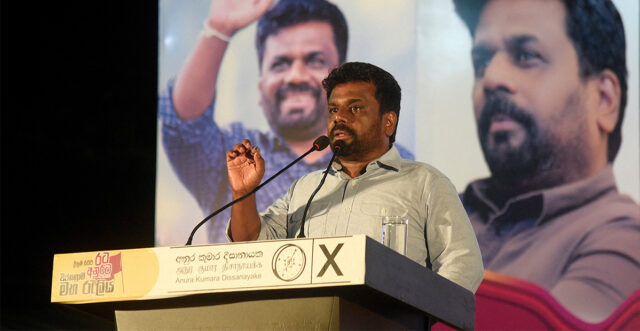Prime Minister Modi reached out to Sri Lanka’s new Marxist president within hours of him formally taking over. Congratulating him on his victory, Modi’s post on X said “I look forward to closely working with you to further strengthen our multifaceted cooperation for the benefit of our people and the entire region.”
Anura Dissanayake was quick to respond, thanking Modi for his “kind words and support. I share your commitment to strengthening the ties between our nations. Together we can work towards enhancing cooperation for the benefit of our peoples and the entire region.”
India’s High Commissioner in Sri Lanka, Santosh Jha called on Dissanayake on Sunday itself to congratulate him and to underscore that “India as Sri Lanka’s civilisational twin is committed to further deepen ties for the prosperity of the people of our two countries.”
The diplomatic exchanges suggest both sides want to get off on a good note. Dissanayake was in Delhi in February this year along with a delegation of his party the NPP and had met External Affairs Minister Jaishankar and NSA Ajit Doval. Doval and Dissanayake met again as recently as last month during the Colombo Security Conclave.
The new president is reported to have lauded India’s role during the economic crisis of 2022 when Sri Lanka went bankrupt.
In an interview following his India visit, the Economic Times quoted him as saying “We are heavily reliant on medicines imported from India and during the last economic crisis, survival was impossible without the food aid provided by India. Even though we may possess independent capabilities, strong international relations particularly with India, are indispensable in navigating the current crisis.”
He also noted, “While this may not align with our preferences it reflects the harsh reality compelling us to leverage India’s friendship to overcome this crisis.”
Was Dissanayake referring to China when he talked about preferences? As a Marxist-leaning politician, much has been speculated about him moving closer to China. But Nilanthan Niruthan, Executive Director of the Centre for Law & Security Studies in Colombo, believes “AKD’s” election may in fact be a positive development for India.
“Simply because he’s a Marxist does not mean he intends to take Sri Lanka in a pro-China direction,” he said. “AKD has been highly critical of the way China has engaged with Sri Lanka over the last decade and a half. He’s been critical of how our national strategic assets like the Hambantota Port were given away to China for almost a century.”
AKD has also criticised how successive governments have borrowed massive amounts of money from China to the point of a debt trap. Under an AKD presidency, this will not go any further.
There’s more. “AKD has been very critical of Indian involvement in Sri Lanka like the Adani green wind energy project,” says Niruthan, “but Bharat has an advantage that China does not, which is the civilisational and cultural connection. The relationship therefore goes beyond politics and economics.”
Niruthan believes India will remain close to Sri Lanka no matter how isolationist the new government may get precisely because of this civilisational and cultural connect. China, on the other hand, will want Colombo to borrow more or build more infra projects. That may not happen with an AKD presidency.
India will still have the advantage even if the bilateral Delhi-Colombo relationship goes down the tube. Niruthan points to AKD’s plans to boost tourism to generate jobs. Last year 1.5 million tourists visited the island, AKD wants to triple that and the main market to be tapped with be India from where Sri Lanka gets most of its tourists.
He also wants to boost the IT sector and the logical partner here again is India. Cooperation could also extend to the dairy sector given Amul’s plans to set up a dairy plant in Sri Lanka. Incidentally, AKD had visited the Amul plant in Gujarat during his India visit.
Thirty eight years in journalism, widely travelled, history buff with a preference for Old Monk Rum. Current interest/focus spans China, Technology and Trade. Recent reads: Steven Colls Directorate S and Alexander Frater's Chasing the Monsoon. Netflix/Prime video junkie. Loves animal videos on Facebook. Reluctant tweeter.





